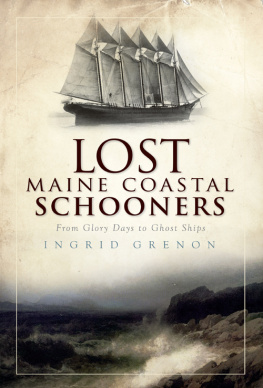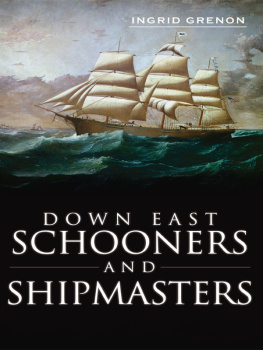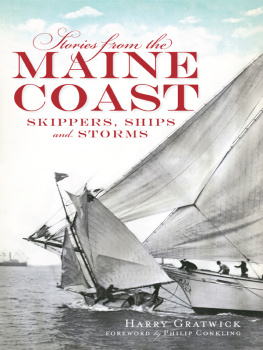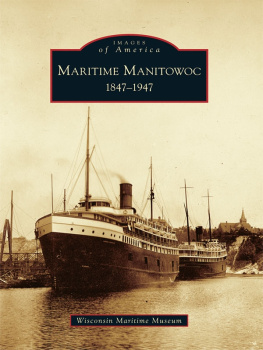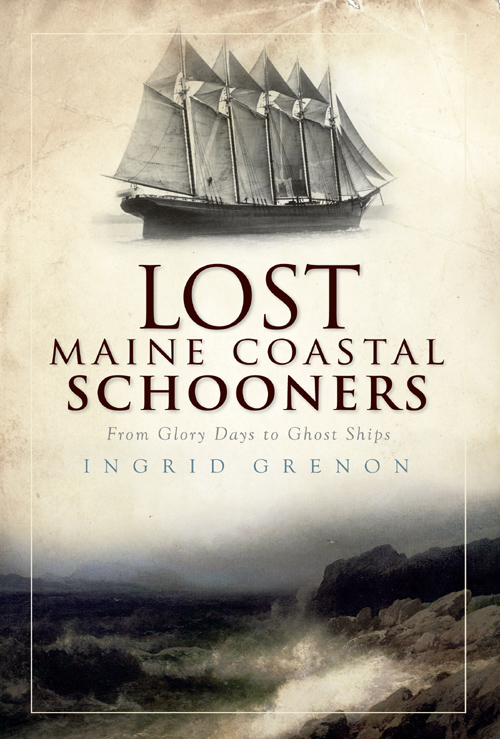Other books by Ingrid Grenon:
Simply This
Published by Antrim House Books in Simsbury, Connecticut www.antrimhousebooks.com/grenon
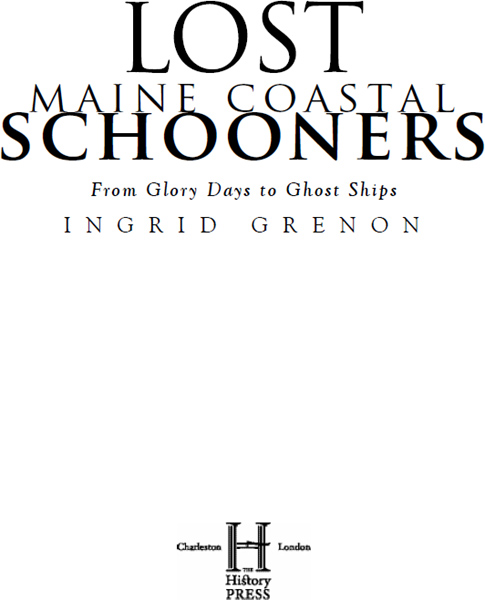
Published by The History Press
Charleston, SC 29403
www.historypress.net
Copyright 2010 by Ingrid Grenon
All rights reserved
Front Cover: Top image courtesy of the Maritime Museum
First published 2010
e-book edition 2011
ISBN 978.1.61423.197.4
Grenon, Ingrid.
Lost Maine coastal schooners : from glory days to ghost ships / Ingrid Grenon.
p. cm.
Includes bibliographical references.
print edition ISBN 978-1-59629-956-6
1. Shipwrecks--Maine--Atlantic Coast--History--Anecdotes. 2. Schooners--Maine--Atlantic Coast--History--Anecdotes. 3. Atlantic Coast (Me.)--History, Naval--Anecdotes. 4. Maine--History, Naval--Anecdotes. I. Title.
F27.A75G74 2010
974.1--dc22
2010008859
Notice: The information in this book is true and complete to the best of our knowledge. It is offered without guarantee on the part of the author or The History Press. The author and The History Press disclaim all liability in connection with the use of this book.
All rights reserved. No part of this book may be reproduced or transmitted in any form whatsoever without prior written permission from the publisher except in the case of brief quotations embodied in critical articles and reviews.
This book is dedicated to my great-great-great-grandfather, Captain William Peachey of Belfast, Maine, master of many schooners and survivor of many shipwrecks; to the English colonists and Maine Wabanaki people from whom I am descended; and to my great-grandfather, Orin Martin, from whom I first learned an appreciation of the sea.
Contents
Acknowledgements
I wish to thank Kimberly Gatto for suggesting that I write this book and Joan Moriarty for her encouragement. I wish also to thank the folks at the Somerset Historical Society, the Boothbay Region Historical Society, the South Portland Historical Society and the Maine Maritime Museum for their assistance with this endeavor and for having patience with me.
I would also especially like to thank Lawrence Lufkin for allowing me to use his wonderful photographs in this book and for his support.
Being From Maine and Portland Harbor
Although this author was born long after the end of the age of sail, I still got to see what had washed up in its wake. I witnessed its aftereffects, like the debris that comes ashore after a turbulent storm. I found it scattered in bits and pieces all around me like the parts of a puzzle that I would have no hope of envisioning in its entiretybut a puzzle that was captivating nonetheless.
My grandmothers family came from Portland, so off to Portland we would go from time to time to visit her parents. Their house on Portlands Western Promenade was unmistakably Victorian: brick with a tower and a spire. Born during the latter part of the nineteenth century, my great-grandparents were unmistakably Victorian, as well. Interestingly, their home was located within sight of the tomb of the family of the great nineteenth-century poet Henry Wadsworth Longfellow. They occupied the kitchen most often, and the focus of the room was a large window overlooking the Fore River at the mouth of Portland Harbor. Thats where my great-grandfather used to sit and watch the ships coming and going.
Grandpa Martin? I asked. How come you always look out the window?
He turned and smiled. Well, cause theres lots to see.
What?
He bent over, picked me up and sat me on his knee. He wore long sleeves and a dark vest with a pocket watch in it. He had a bit of a belly, and his white hair hanged down at the sides of his head. He wore glasses.
Cant you see whats out there? he asked.
I looked out the window. It was sunny, and the light came in and flooded the room. I see boats.
A-yeah. Boats. Ships. I like to watch them come and go out of the harbor.
I looked. There was something calming about it all: the ocean, the waves, the ships being nudged by tugboatsall seemed to be part of a rhythm.
When I was a young man, I used to sail out of this harbor to England. Then I purchased apples for a produce company here in Portland. Now I just sit here in this chair and watch the ships come and go.
When I looked out of the window again, I realized why he sat there. I, too, was becoming mesmerized by the view out the windowthe rhythm of the sea and the thought of sailing ships and such. For a moment, I wondered. If I tried hard enough, could I see the old sailing ships, too?
Days turned into years, and years into decades, and I still remember my great-grandfather looking out of the window to Portland Harbor and out to the sea. I knew that he was watching the old sailing ships, vessels that had turned to dust, except in his mind. Now it was he who had turned to dust, except in my mind. And what of the old ships he had so fondly recalled?
Being from Maine, in proximity to those who have a reverence for the sea, I was spared no detail of my heritage. I recalled hearing stories about the other side of the family. The stories were about my great-great-great-grandfather, Captain William Peachey, who was a shipmaster throughout much of the nineteenth century. He was born on Mount Desert Island, Maine, in 1805 and lived in Belfast, Maine, for most of his life. I remembered the ships he lost; one was the schooner Oneco that went aground near Cape Hatteras, North Carolina, during a storm in September 1839 with a cargo for Portland. When the wreck was discovered, one man was found dead, lashed to the rigging. Fortunately, the rest of the crew were saved. In particular, I remember a schooner named General Meade that was lost on Green Island Ledge near Portland on December 12, 1876, with a cargo bound for Boston. Ancestor Peachey was seventy-one years old then and still a master of schooners.
I imagined that the icy, wintry waters off Portland Harbor in December must have been unbelievably cold. What kind of a man, I wondered, would have wanted to be out at sea that late in his life during an ungodly and frigid New England winter? Could it have been that there on the ocean, standing on the wooden deck of a Maine coastal schooner, he felt the most alive?
I did not appear on this planet until long after the last coasting schooner was scuttled or laid to rest and left to rot. I would not have known of the existence of such ships if I had not been from Maine or if I had not caught a glimpse of the remaining Wiscasset Schooners in their final berth in the summer of 1964 when I was just four years old. There was something about the wooden weather-beaten vesselsambassadors of another era sitting mired in the muck at low tidethat seized my attention and compelled me to stare.
Never able to shake my fascination with the old four-masted vessels, I would return to Wiscasset from time to time just to visit them and stare at them, spellbound, as I did when I was a child. They were still haunting me. I wrote a book of poetry, Simply This, which included a poem entitled Wiscasset Schooners. What surprised me was the number of people who, after reading or listening to the poem, told me that they had heard of the ships, seen the ships, photographed the ships or simply identified with them in some way.
The schooners continued to haunt me. I knew that I could find no rest until I captured the ships more thoroughly, tried to do them justice somehow or tell their story. I became increasingly interested in Maine commercial schooners of all sortsnot just the type that ancestor Peachey sailed or the four-masted vessels waiting in Wiscasset. What of all the other coastal schooners? What has happened to them? Where are they now? Who were the men who built them and sailed them? Why did they persist for so long into the twentieth century, seemingly trying to forestall the inevitable?

